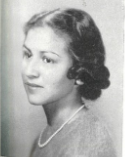Elizabeth Marion Roe-Cloud ’38, a member of the Winnebago tribe, was Wellesley’s first Native American graduate. While at Wellesley, Elizabeth Marion Roe-Cloud was often treated not as a human being, but rather as an exotic oddity, with a 1936 newspaper clipping excitedly declaring that “Marion Roe-Cloud, a member of the sophomore class at Wellesley, is an Indian Princess.” The clipping goes on to say that Roe-Cloud’s “rights to the title of American citizenship make those of the ‘Mayflower’ descendents look pale.”
Marion was born and raised in Wichita, Kansas and was educated at several Native American institutes before attending Wellesley College. Her father, Henry Roe-Cloud, was the head of the Haskell Institute in Kansas, which was founded in 1884 as a “residential school,” where Native children were forcibly assimilated into Western culture. Her father, who was identified by The Wellesley News as “the Chief of the Bird Clan of the Winnebago Indians,” later worked to pass the Wheeler-Howard act. This act, more commonly known as the Indian Reorganization Act, was intended to decrease federal control of Native American affairs.
Roe-Cloud lived in Munger during her time at Wellesley, and she decorated her dorm room with what The Wellesley News termed “tribal offerings to the daughter of an Indian Chief,” including ceremonial rugs from the Navajo nation, Cheyenne moccasins and “Sioux slippers of porcupine quills.” Roe-Cloud was a member of the Phi Sigma society, a Durant Scholar and Editor-in-Chief of the Legenda. She completed an Honors thesis in Sociology titled “Indian Land Policy and its reconstruction in the United States with special reference to the Kickapoo Reservation.” When she graduated from Wellesley, Roe-Cloud wore traditional regalia under her robe as a tribute to her heritage. A Wellesley publication described Roe-Cloud in her regalia as a “true Hiawatha maiden.”
After graduating from Wellesley, Roe-Cloud attended the Graduate School of Social Service Administration at the University of Chicago’s Graduate School of Social Service, leading her to work in the Immigrants Protective League. Some time later, Roe-Cloud married and settled in Portland, Oregon, where she became director of the Friendly House Community Center from 1960 to 1969. She was also the coordinator for Girl Scout troops in the North West. Roe-Cloud encouraged Native youth to join the scouts, emphasizing the benefits of scouting to “Indigenous youngsters.” She pushed for more Native Girl Scout troops, as well as for existing scout troops to work near and on reservations. During this time, Roe-Cloud also served as the president of the Portland League of Women Voters.
Roe-Cloud then pivoted to working with the eldery population. She became the Director of the Oregon state program on aging. Additionally, she was a member of the Joint Legislative Assembly Advisory Committee on the Aged and she attended the White House to speak of her work. Roe-Cloud said of her experience working with the elderly, “I take great pride in the competence and expertise of my staff, since Oregon in the past three years has consistently come up with ‘firsts’ in the field of aging.”
When asked by a Wellesley publication in 1936 about her reasons for attending Wellesley, Roe-Cloud said, “my point in coming to Wellesley is to equip myself with modern methods of social service practice so that I can take back to my people the best of your civilization.” The Wellesley publication goes on to explain that “the splendor and strength which her beautiful Indian possessions symbolize are gone. Her own tribe is reduced to only 2500, and she wants to help her people get a new lease on life.” As the first Native American graduate of Wellesley, Roe-Cloud helped her people by paving the way for future generations of Indigenous Wellesley graduates.
In 1974, a friend of Roe-Cloud nominated her for the Wellesley Alumnae Achievement Awards based on her work with the elderly and the Native population in the Northwest. Despite all she had done for the elderly population in Oregon, all she accomplished for Native Americans, the prejudice she had to overcome and the love she had for Wellesley, she was not nominated. As a result, her work, contributions and achievements are essentially lost. However, Roe-Cloud said that her time at Wellesley was an “unforgettable experience.”




